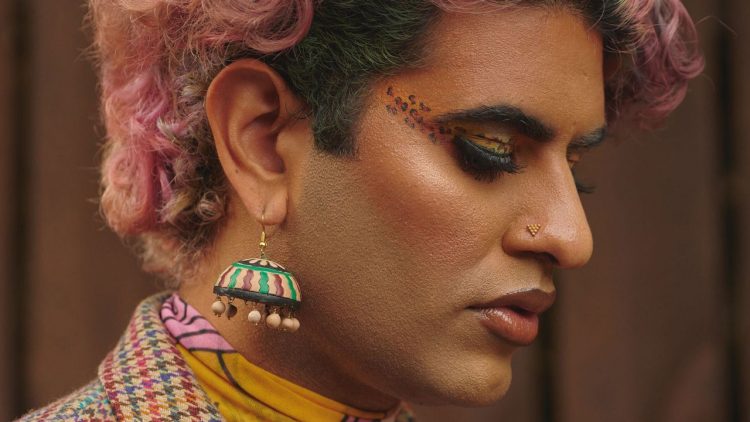Writer, performer, activist, and designer Alok Vaid-Menon reflects on gender, self-expression, and the need to reimagine beauty. As told to Sam Escobar.
When I wake up in the morning, I ask myself a question: What am I feeling today? It is less about a physical location, or where I’m going, and more oriented to an emotional location. And, from there, I dress.
I live in New York City — the place where my girl Loop the Loop, an early-1900s sex worker would just walk around in full glamor all the time. People knew that gender-nonconforming people were an integral part of cities like ours. And now, they have the audacity to say that I’m new to media? (What media are you consuming, sweetie?) If we look at the history of this country — all the outfits, all the aesthetics, all the ideas and ways of being came from our shows and were then pushed into Hollywood and mainstream fashion. I am not new, nor are other folks like me; I am part of a historic tradition that has been systemically, intentionally suppressed.
I like people watching in my city. I love that I see people who are different every day and people don’t bat an eyelid. It gives me permission to wear what I want and not fear being seen as some sort of freak. Or, rather, in New York, we’re comfortable with freaks — and that’s a good thing. I like being part of a mass of people. It makes me feel less lonely (an emotion that I strive to prevent others from feeling, too). I like things being open late; those late-night food runs are essential for me. There’s really nowhere else in the world I could live — a theory that was reaffirmed once again during the early, restrictive periods of lockdown.
I was raised in Texas, home to countless amazing communities, cultures, subcultures, artists, and activists — and, right now, some of the most restrictive legislation toward LGBQTIA+ people, particularly trans and gender-nonconforming youth. Growing up, beauty was a thing that I never felt like I could have. I think I had a deeper and more intimate relationship with ugliness. [Beauty would] feel like a failed project. No matter what haircut I got or what I wore, I had no control of the indelible fact of my upbringings. I was brown and hairy and queer and gender nonconforming and all the things that were “wrong.” I did not know anyone who looked like me, or who felt or thought like me, so I was made to be like the leftovers of other people’s beauty making: In order for them to be beautiful, I had to not be.
“We have to help one another be able to express each other, express ourselves.”
At the beginning of the pandemic, I made the (perhaps unwise) decision to move back to Texas and into my childhood home for almost a year. While many queer people have spoken about feeling freer to experiment with their appearances at home — away from the potential judgment or malice of those who would find themselves, however illogically, upset by a person’s lipstick or dress or hair — I experienced the inverse. Suddenly, it wasn’t physically safe for me to present as myself. It reconfirmed how instrumental and foundational self-expression is to me on a cellular level. The way I adorn myself is so deeply related to my mental health that it was only when I left and finally felt the breath reenter my lungs that I realized how constricted it had been.
Source by www.allure.com


